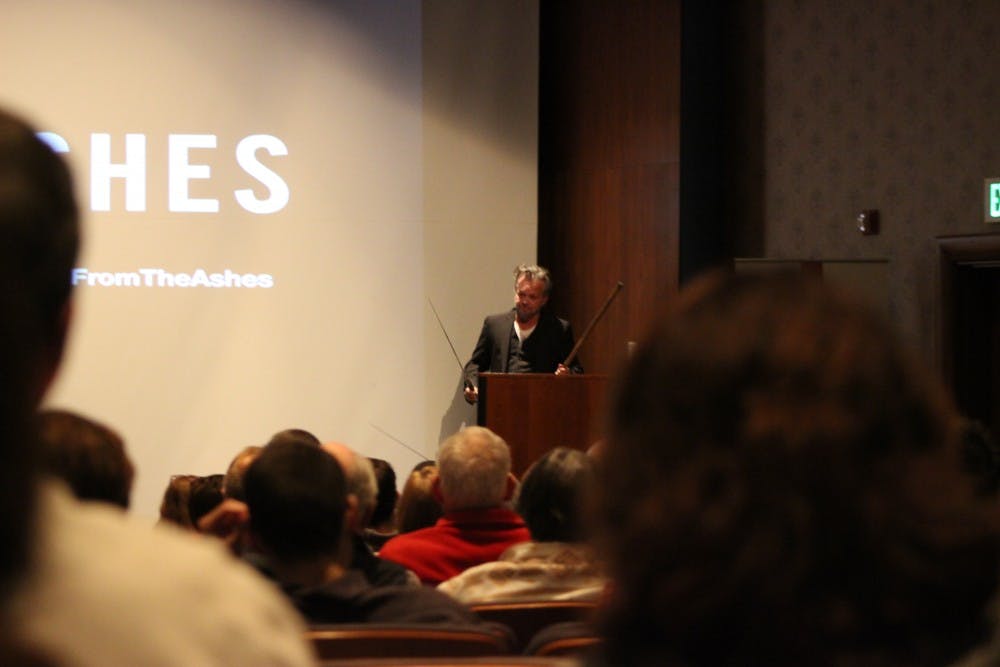John Mellencamp made a last-minute appearance at IU on Feb. 9 to introduce the coal-centered documentary “From the Ashes”.
A crowd of about 400 in the Whittenberger Auditorium clapped loudly as he made his way to the stage with the help of a wooden cane.
“You people are probably wondering, ‘Why does John have a cane with him?’” he said. “Well your conclusion, whatever it is, is wrong.”
He asked the crowd if anyone knew why men used to always carry walking sticks.
“Protection,” he said, whipping a long metal rod out of the bottom of the cane and thrusting it in the air.
But man doesn’t need a cane for protection anymore, he said. The world pivoted from that with changes in technology.
“Once upon a time, coal was the necessary situation people had to have,” he said, segueing to the topic at hand. “Today, not so much. We are pivoting. Pivoting means staying on one foot and remembering what you know but looking the other way and having focus on what is in front of you.”
Mellencamp’s walking stick analogy was all in the name of conveying to the audience that coal was an outdated technology, the topic of the documentary Mellencamp was there to introduce.
Mellencamp recorded a song for the 2017 documentary, a cover of Merle Travis’ 1946 song “Dark as a Dungeon,” which appears in the film’s end credits. The film’s director, Michael Bonfiglio, also directed a music video of the song, which the audience watched after Mellencamp left the auditorium.
The video shows Mellencamp in black and white, accompanied by black and white footage of coal workers mixed with colored footage from the film of current-day coal production.
Mellencamp sings in a deep, rough tone, with just his acoustic guitar. He’s backed by a fiddle, harmonica and tambourine, with a woman’s voice floating harmonies on top of his singing.
“Oh come all you young fellers so young and so fine / Seek not your fortune in a dark dreary mine / It'll form as a habit and seep in your soul / Till the stream of your blood runs as black as the coal,” he sings.
“I think what the song does, it so encapsulates the human side of coal mining,” Bonfiglio told the Indiana Daily Student. “It really brings it home in a personal way and that’s what we were trying to do with the film.”
Bonfiglio said he was thrilled Mellencamp was getting behind the film and bringing its messages to IU students.
Mellencamp said those involved in making the film had their heart in the right place.
The documentary was supported by Bloomberg Philanthropies, who had connections with Mellencamp and asked him to be involved, Bonfiglio said.
The film screening and Mellencamp’s appearance was co-sponsored by the School of Public and Environmental Affairs and the Integrated Program in the Environment.
IPE Director Jeffrey White told the IDS he liked how Mellencamp took a song from 60 years ago and brought it into a modern context to show how coal miners still face the same issues today.
Mellencamp is doing things with his recognition to help causes, White said.
“I can’t do that,” White said. “I’m a scientist. I don’t have the street cred of John Mellencamp.”
Mellencamp founded the benefit concert Farm Aid in the 1980s to fundraise for American farmers in debt.
He was politically outspoken through his music during the former President George W. Bush administration. Mellencamp criticized President Trump’s desire to bring back coal during his introduction of the film.
“John has never shied away from standing up what he believes in,” Media School Professor Emeritus Ron Osgood said in his introduction of Mellencamp.
Osgood made the documentary, “Trouble No More: the Making of a John Mellencamp Album,” in 2004 and has also made documentaries on climate change.
Mellencamp’s introduction of “From the Ashes” consisted of personal stories as analogies for coal as an outdated technology.
“You hear a lot about, particularly from this administration, we’re going to bring coal back,” he said. “Why? Are we going to bring the walking stick back?”
The crowd laughed as he brought the message full circle.
“The coal industry needs to realize they’re done, and the rest of the world is pivoting,” he said. “The future is not coal. The future is not coal.”




